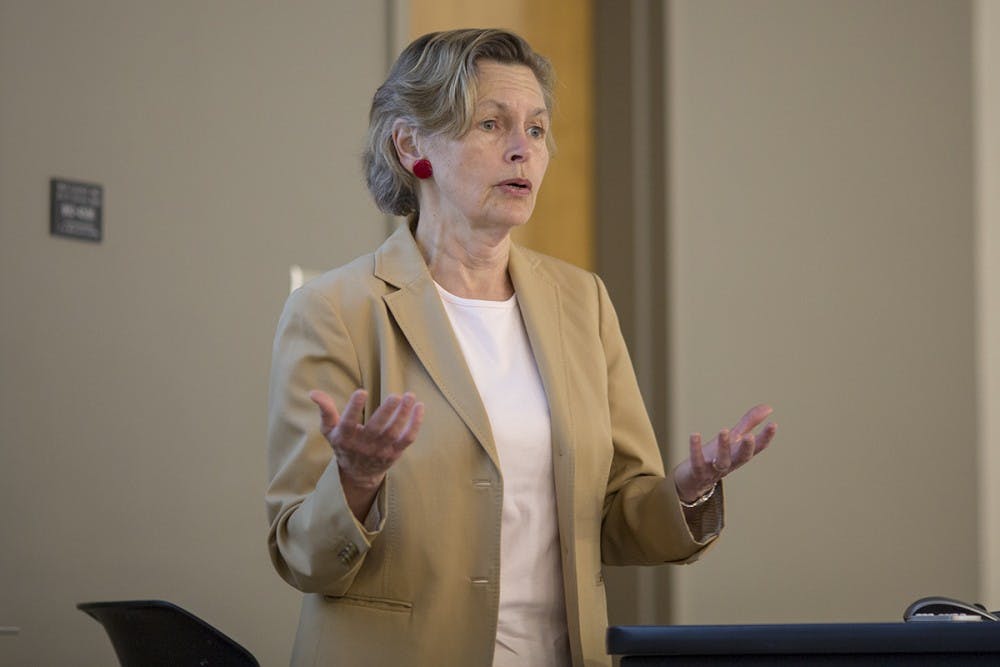Charlottesville City Councilor Kathy Galvin spoke on local zoning, land use and affordable housing with the University Democrats at the group’s weekly meeting Wednesday. Galvin graduated from the University with a Master’s of Architecture and is an adjunct faculty member in the Architecture School.
Galvin’s remarks focused heavily on the intersection between urban planning and local politics.
Galvin’s speech explored the problems with the Charlottesville housing situation and its need for the “Missing Middle” of affordable housing. Galvin discussed the role of the Charlottesville Strategic Investment Area plan to create a better housing and living situation in a select area based on her time as member of a steering committee for the initiative in which members set out the goals for the project.
The area makes up less than five percent of the city's 10.4 square miles and includes portions of the Fifeville, Belmont-Carlton, Ridge Street and Martha Jefferson neighborhoods.
The SIA was originally approved by the City Council as a project in 2014 and has three main aims: equity, health and safety and sense of place. The goals of the SIA are to plan future redevelopment opportunities within the defined area to include the preservation of public and assisted housing in the revitalization of impoverished neighborhoods and increase access to health, education, transportation and food sources.
A quarter of the housing in the SIA is public housing and over 70 percent of the children in the area are on free school meals. Galvin also said the place is a food desert.
“There are consequences to the geography of a place,” Galvin said. “When it doesn’t have good parks or good walkable streets or a healthy grocery store. You see it in Charlottesville, 31 percent of African-Americans fifth-graders are obese with only 6.5 percent of white fifth-graders being obese.”
Galvin said she wanted to ensure this project took place without dislocation of people and without discrimination.
“As an architect, I’m quite sympathetic to the physical character of the neighbourhood, people like the way their neighbourhood looks,” Galvin said. “But I am not sympathetic to perpetuating the social, economic character of the neighbourhood, because that gets into discrimination.”
The City of Charlottesville is currently trying to switch from conventional zoning into a form-based code. Form-based coding is a way to regulate the size and form of a lot first, and the type of building second. Whilst conventional zoning which has been used in most urban planning in the past, it has resulted in segregation of land lots through simple numeric values such as dwellings per acre and parking ratios.
Galvin drew on the principles of Jane Jacobs — a journalist and urban planning activist who likened urban renewal to slum clearing — to reject the urban renewal which had taken place in the 1970 and 80s. More specifically, Galvin discussed the implementation of small blocks and large sidewalks in neighborhoods to encourage walking as a means of travel and to increase accessibility.
Galvin said she was excited to be a Democrat as she said the Democratic party has the power to enact change.
“The Democratic party has got to be the party who believes in fixing things,” Galvin said. “We’re not anarchists and we’re not fascists. We believe in good government, when you’ve got good government you can fix problems. It’s exciting.”
Joseph Dennie a second-year College student and communications director for the University Democrats, said he was pleased with the speech as it related issues directly to Charlottesville.
“As was signified during her presentation, a lot of people have a very strong interest in planning, especially as it relates to the university,” Dennie said. “I’ve gotten the broad strokes in planning classes and at U.Va’s Architecture School so getting to see the more general theories applied in the context of of Charlottesville itself was pretty neat.”
In an interview following the event, Galvin said she wanted to particularly inspire students to get involved with politics at the local level.
“I am very very passionate about inspiring the young generation to get into politics and understand the governance,” Galvin said. “Tonight we talked about zoning and planning – those are major tools at the local level. You get to the state and you get to the national level and there’s different kinds of legislation.”
Sam Finkel, a third-year Batten student and vice president of the University Democrats, reached out to Galvin because of the way she has been representing the Democratic Party on the City Council. Galvin is one of four Democratic members of the Council, along with Councilor Mike Signer, Councilor Wes Bellamy and Vice Mayor Heather Hill. Mayor Nikuyah Walker was elected to the Council in November 2017 and is a party-unaffiliated independent.
“We’re always excited to hear from our representatives, people that are serving in our capacity and have a mandate to represent our public interest,” Finkel said. “We’re proud to have [Galvin] on our network because she’s so hard-working, so dedicated and so brilliant at representing us in the city council.”







